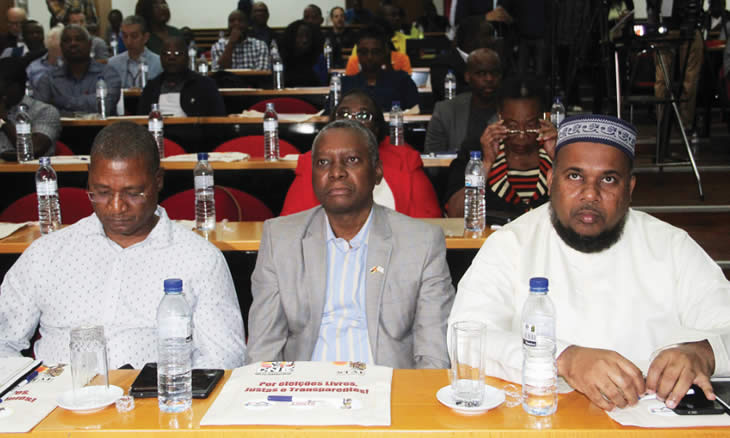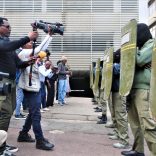Mozambique: At least 45 homes burned down by alleged terrorists in Nampula province - government | ...
Mozambique Elections: CNE denounces obstacles in issuing election credentials for observers , political party monitors – AIM report

The chairperson of Mozambique’s National Elections Commission (CNE), Abdul Carimo, on Friday criticised local election officials, particularly in Maputo municipal districts, who are deliberately delaying credentials required for next Wednesday’s municipal elections.
Without credentials, observers and political party monitors will be unable to enter the polling stations and check that the rules are being observed and there is no foul play.
This scandal was denounced earlier this week when the “Mozambique Political Process Bulletin”, published by the anti-corruption NGO, the Centre for Public Integrity (CIP), reported that party monitors were refused credentials because of illegal demands by local officials for documents.
The election law says that parties only have to submit lists of names of monitors, 20 days before the election.
But Sande Carmona, spokesperson for the Mozambique Democratic Movement (MDM) said that some local election commissions are also demanding documents normally only required of candidates, including a criminal record certificate and a declaration of residence issued by neighbourhood officials.
The Bulletin notes that these election officials often have links with the ruling Frelimo Party. The MDM also claims that neighbourhood secretaries have been given instructions to delay issuing the documents.
In some areas, the names for party monitors have been accepted, but the credentials have still not been issued. This complaint comes not only from the MDM, but also from Frelimo and from one of the minor parties, Pahumo (Mozambique Humanitarian Party).
This situation clearly irritated the normally calm Carimo. Addressing a public meeting in Maputo called to demonstrate the software that will be used in the elections, he announced that the CNE was effectively stripping recalcitrant Maputo district election commissions of their power to issue credentials.
The question of credentials would be centralised – in particular, all Maputo City requests for credentials would be submitted to the elections operations centre of STAE (Electoral Administration Technical Secretariat), the executive arm of the CNE, which is currently working out of the conference centre owned by the telecommunications company, TDM.
“Observers should be accredited on the same day that they submit their application”, said Carimo – and if the excuse was that the district had run out of plastic credential cards, then paper credentials should be issued.
“The electoral bodies must make an effort to meet the demand, so that everything is in order before Wednesday”, he added. Carimo also noted that observer groups and political parties often delayed applying for credentials to the last moment “which doesn’t help us”.
Carimo also rebutted the frequent claims that election materials, particularly polling station results sheets (“editais”), go missing, and somehow mysteriously disappear from the CNE. This rumour can be traced back to one malicious report after the 2014 general elections (Carimo did not mention the name of the paper concerned, but it was the anti-government weekly “Canal de Mocambique”).
Carimo recalled that a reporter on the paper had contacted him at 21.30 one evening asking to see the results sheets from the provinces. He told the reporter to call in at the CNE offices at 07.30 the following morning, and he would be given copies of the editais. He was surprised to find, at 06.00, that a new issue of the paper was on sale, with his picture on the front page, and a headline declaring that he was a “thief of results sheets”.
There was no truth at all in the story, he said, yet even today some of the media continue to claim that the CNE announced results from the 2014 elections without having the polling station results sheets.
He pointed out that the three parties represented in parliament (Frelimo, the MDM and the former rebel movement Renamo) are represented at all stages in the election procedures. In particular, the election materials (including the results sheets) are kept in locked provincial and district storerooms. The three parties each have keys, and the stores can only be opened if all the keys are used simultaneously.
Furthermore, at each polling station copies of the results sheets are given, not only to the political party monitors, but to any observers or journalists who want them.
“So who can make the editais disappear?”, asked Carimo.
“Rumours are not helpful”, he said – indeed, the spreading of rumours and falsehoods could lead to “waves of violence”.












Leave a Reply
Be the First to Comment!
You must be logged in to post a comment.
You must be logged in to post a comment.